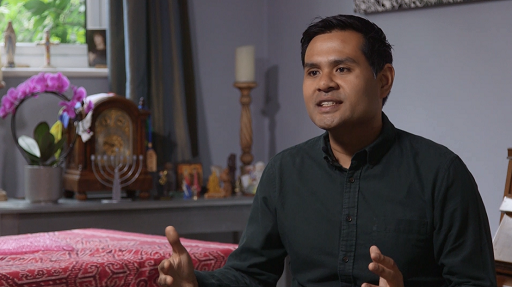1 Attitudes to male same-sex relationships in Islam tradition
What do you think is the Islamic teaching regarding sexual preference?
As you think about this question, ask yourself where your ideas about this topic might have come from – from a newspaper or magazine article, a book, your social media feeds, or somewhere else?
Activity 1
Watch this interview with Dr Shanon Shah and make a few notes about the main points.

Transcript
Discussion
As regards-same sex relationships, Dr Shah explains that there was no reference in the traditional Muslim sources of authority to homosexuality as such, and no word in the Qur’an (nor incidentally in the Hebrew religious texts or the Christian Gospels) that can be translated as homosexuality. The word itself is a modern one.
It’s worth pointing out here that although Dr Shah doesn’t say so in the video, in his book he explains that drawing on the stories in the Bible, the Qur’an itself refers at a number of points to the story of Lot and God’s destruction of his people by hurling ‘stones of baked clay … layer upon layer’ (Q. 11:82) on their town (Shah, 2018). It’s usually argued that this was a punishment for the fact that the men had engaged in forbidden sexual activity.
Going back to the video, Dr Shah also makes some helpful points about the development of Muslim legal traditions. Muslims wanted to live in a religiously-lawful way, and over the centuries Muslim legal experts discussed a great range of issues, including sexual relationships. He also explains that in Islamic legal tradition there has traditionally been room to accommodate local cultural norms, so that it has been, as he puts it, ‘contextual’.
These legal experts’ discussions were encapsulated in fatwas, legal opinions, issued by individual experts. Often the experts did not agree with each other, and so their opinions differed. Nevertheless some opinions or interpretations have become more influential and widely accepted, and others may be difficult to find. When it came to sex, the majority view did come to be that the only legitimate sexual relationship was between a married man and his wife (or wives) (and also between a man and female slaves). The four main Sunni legal schools agreed that sexual relationships between men were sinful, and three of them argued that they should be subject to capital punishment.
But the legal experts did not all agree with this. Dr Shah gives the example of the Iberian or Andalusian scholar Ibn Hazm (994–1064 CE). A ‘poet, historian, jurist, philosopher and theologian’, Ibn Hazm has been described as ‘one of the greatest thinkers of Arabo-Muslim civilization’ (Arnaldez, 2012, p. 1). Dr Shah explains that he had what were quite tolerant views on same-sex relationships, arguing that they were only a problem if they led to social disruption. If you are interested in learning more about Ibn Hazm there are some resources listed in the Further reading list at the end of this course.
In practice, before the nineteenth century it seems that extreme punishments were rarely inflicted on men who had sexual relationships with other men. Often what Kecia Ali, author of a book on sexual ethics and Islam, calls ‘don’t ask, don’t tell’ norms prevailed, and provided those engaging in them were reasonably discrete, such relations were tolerated and those participating in them were not prosecuted (2016, p. 107). If it did come to a court case, in practice judges often imposed milder punishments, and governments often introduced their own legal codes which prescribed much more lenient penalties.
